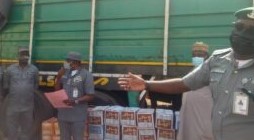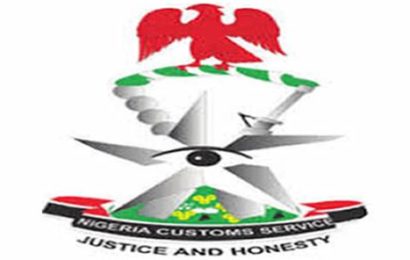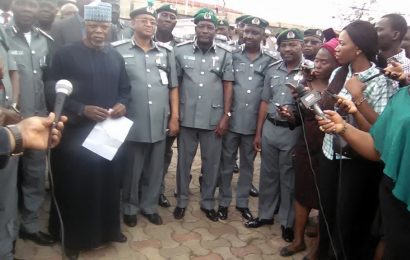Advertisements

By Lanre Badmus –
After months of mere sound bites and public statements, a Presidential Enabling Business Environment Council has been approved by President Muhammadu Buhari, to drive government’s promise to significantly reduce the cost of doing business in the country. It’s no longer news that Nigeria, despite her huge resources and market size, is lowly rated globally in the ease of doing business. This Council must perform if Nigeria is to step out of the current recession hole.
As a country that relies heavily on imports, addressing corruption at the borders and ports is critical to reducing the cost of doing business in Nigeria. The Nigeria-Benin Republic border at Seme, described as the country’s busiest trade route, reflects the inefficiencies plaguing the flow of goods inward and outward of Nigeria. The Seme border post is characterized by a poor working environment for border officials; primitive office accommodation, absence of basic social amenities, and a deplorable road network which is unbefitting of an regional gateway. The situation at the border rather than facilitate trade, creates a supportive environment for corruption.
There are two markets on either side of the border. While the market in Benin Republic (Krake) fed by the port in Cotonou continues to expand, that on the Nigerian side (Seme) has gradually lost its shine. This has been attributed to the decision of succeeding Nigerian leaders to embrace an import substitution policy as against the “open trade” approach by Benin Republic, thus imports landed in Benin are relatively cheaper, an incentive to smuggle by Nigerians.
What you observe during the day are commercial buses, motorcycle riders and private vehicles moving through the various checkpoints mounted by the different agencies of the State on either side of the border. Each checkpoint collects an un-receipted toll, and those who regularly ply the route know the amount to pay at each particular stop.
It’s also not uncommon to see Nigerian law enforcement personnel in their uniforms either on motor bikes or using government vehicles to “cross” from Krake (Benin Republic) to Seme (Nigeria) with bags of rice, vegetable oil and other consumables, items already banned from being imported through the land border. Night time is for the big “boys” and “girls”. The Seme-Krake border post is more of a market route, where border officials sought to extract bribes (openly or covertly) from traders and transporters.
High trade cost is fueled by an inefficient transport bureaucratic infrastructure, and research has confirmed that corruption is a key element in the Nigerian situation. Sandra Sequeira and Simeon Djankov (2013) posited that corruption at borders and ports has a detrimental impact on shipping costs, intra-regional trade, international exports, revenue collection and the country’s general business environment. Corruption at borders and ports is also likely to facilitate a wide range of illegal activities such as smuggling of people and goods, tax-evasion and cross-border crimes involving drugs, illegal immigrants, contraband, fuelling insecurity, violence and in some cases insurgencies.
Corruption at our borders and ports has been very difficult to tackle as almost all the trade parties are involved: customs/police/immigration officers, port authority and terminal operators, inspection and quality control agents, customs brokers and even financial service providers. Two forms of corruption in the port/border have been identified – “collusive” corruption when public officials and private agents collude to reduce or evade tariffs and “coercive” corruption where port/border officials extract bribes from companies or clearing agents for performing routine processes, referred to as facilitation or un-receipted payments, (Sequeira; Djankov 2013). The situation in Nigeria is a hybrid of the two.
In 2013, a risk assessment study of the port industry in Nigeria carried out by the Maritime Anti-Corruption Network (MACN), UNDP and Nigerian anti-corruption agencies discovered cases where 142 signatures are required to process a cargo at the Lagos ports. Quoting from the report of this study, “some of the main challenges identified included weak internal ethics infrastructure in port agencies (such as the lack of codes of conduct), weak enforcement practices, and under-developed systems for investigating complaints of demands for bribes or facilitation payments, including no effective system for handling grievances and protecting whistle-blowers”.
These challenges according to the study “are compounded by multiple, often overlapping procedures, ill-defined standard operating procedures, and a lack of coordination among the agencies. Agencies’ broad discretionary powers result in an unpredictable operating environment for companies; for example, a practice that may be legal at one port may unacceptable at the next. Further, port agency employees hold broad discretionary powers and sometimes delay the processing of documents, often without repercussions”.
The study recommended the development and implementation of standard operating procedures (SOPs) for port service providers, to strengthen transparency and accountability in the system. Others recommendations include the establishment of a complaints mechanism for potential or actual acts of corruption; the deployment of IT infrastructure to reduce human contact. Some of the more specific actions include anti-corruption training, signed policy documents to signal commitment from the uppermost levels of management, and coordinating guidelines and instructions among the different port agencies to ensure there is no overlap and that the process for vessels and cargo clearance are efficiently managed.
Last month in Abuja, Vice President Yemi Oshinbajo, who is also the chair of the Presidential Enabling Business Environment Council, launched the SOPs for agencies of government at the port as well as an online platform named Port Service Support Portal (PSSP), for the dissemination of critical information and handling of complaints in a structured and transparent manner. The PSSP will be hosted by the Nigerian Shippers’ Council, in line with its mandate as the port economic regulator.
As aptly captured by Vice President Oshinbajo in his address at the launch, “technology remains one of the most important ways by which we can control corruption aside from the consequences of ensuring that corrupt officials are made to face the consequences. The SOPs and portal will improve the processes for dealing with internal and external complaints from port agents. The system would improve transparency, accountability and create a more user-friendly business environment at the ports”.
The World Economic Forum (WEF) reports that corruption, on the average, adds 10 percent to the cost of doing business, it is estimated that as much as 25 percent of Africa’s GDP may be lost annually due to corruption (Makhlouf 2016). In the case of Nigeria, these figures would definitely be higher.
Clearly, the Ease of Doing Business Inter-ministerial Council has to target those factors that create incentives and opportunities for corruption at the ports and borders. Delays and high tariffs are perceived to be major constraints to cross-border business and one of the greatest opportunities for bribery. Declaration and valuation are the customs processes which are most prone to corruption. Given the central role of the customs administration in the flow of trade across borders, efforts should be concentrated to curb corruption by personnel of the Nigeria Customs Service as well as state officials involved in clearance process. Except and until the monster of corruption is tamed at the ports and borders, Nigeria’s economy will never be competitive.
Lanre Badmus
Editor, Africa Shipping & Oil Digest




